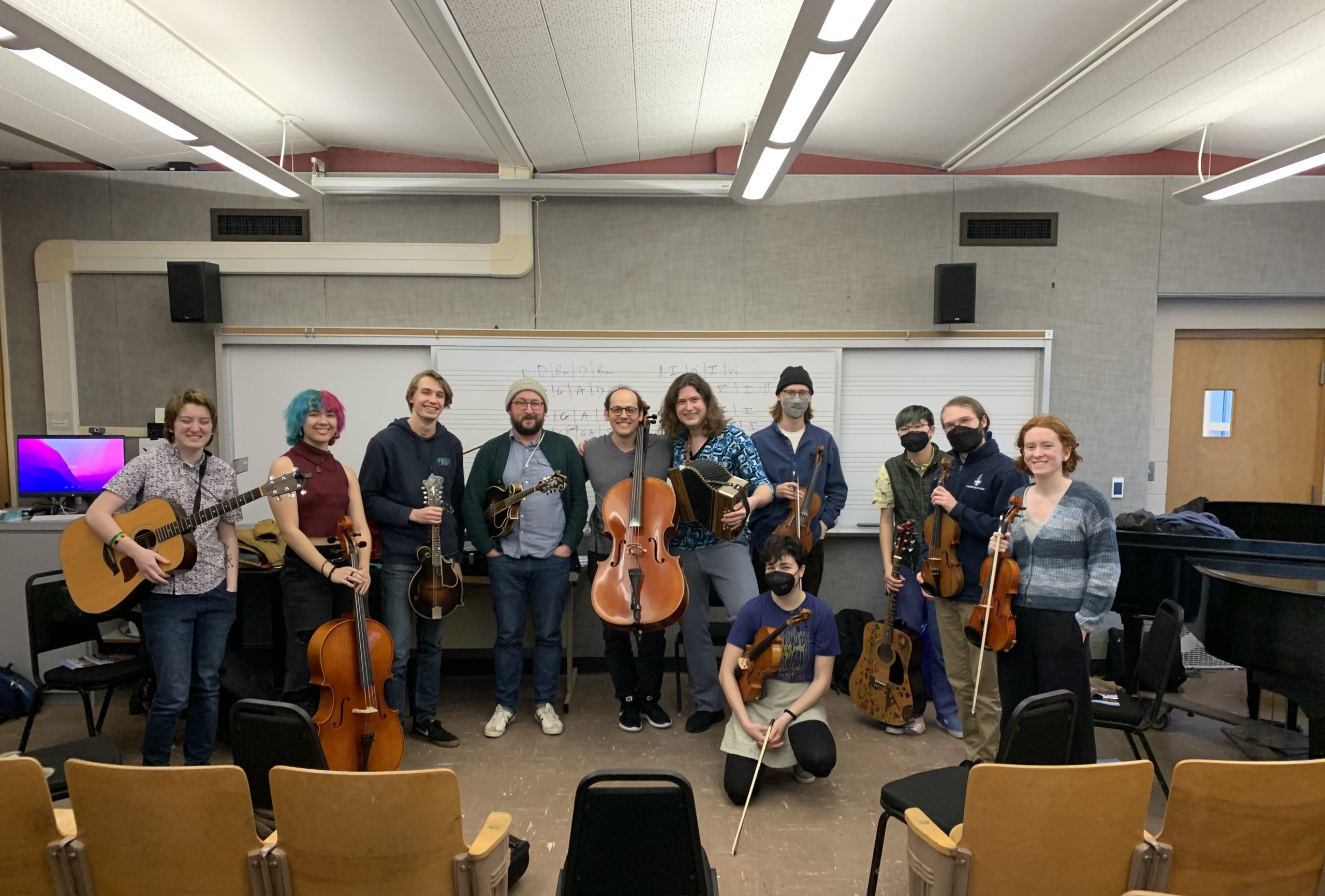Visting ensembles to Lawrence University typically conform to a single stylistic envelope, but the Mike Block Trio is an exception. An ensemble of wide-ranging repertoire, it includes the composer and cellist Mike Block, the mandolinist Joe K. Walsh and the bassist Zachariah Hickman. Unfortunately, at their Jan. 25 concert in Harper Hall the group was without Hickman, who fell ill shortly before. Regardless, the duo delivered enormous stage presence and energy, with a highly diverse program.
They opened with “Won’t Have to Wait” a Block original from the group’s “What Now?” album. Though the words appeared cliché—the lines “Everyone needs someone” and “I’ll be there for you” were frequently repeated—a strong enthusiasm was always present. Block approached the cello in a diverse fashion, treating it as a tool for lyricism, percussion, accompaniment, and tone. Although Walsh’s facial expression remained consistently sullen, his excellence in providing rhythmic and harmonic vitality did not go unnoticed.
What followed was the namesake tune of their album “What Now?” where harmonic progression was replaced by development via pure repetition. The third tune “Koromanti,” was particularly interesting. Block gave much context, commenting that it was the earliest known song from enslaved Africans, in this case descended from the Akan tribe of Ghana. It was transcribed in 1687 by the otherwise unknown Mr. Baptiste in Jaimica.
Later songs included the colorful “Go Jake,” the Bill Monroe poem-based “Footprints in the Snow,” an elegant Sarabande by Charles Dieupart, the frequently chromatic “Highland Ridge,” and “Pizza Box” by Danny Barnes. The last of these, Walsh explained, was about nothing more than its title indicated. The duo ended with the Fiddle tune “Angeline the Baker” and the Block original “One Fine Day” ended the exhilarating program.
The cello was used by Block to its fullest capacity, with adventurous experimentation in articulation, pitch, rhythm, volume and bowing. He used a strap created by himself—the “Block Strap”—to allow him to walk and dance with the cello. Throughout the night Walsh alternated between mandolin and guitar, occasionally joining Block’s singing with subtle harmonies. Both musicians were eager to credit each other, often motioning back and forth for the other to receive applause.
Block described the group as “Bluegrass Adjacent” and representatives of that genre were featured throughout. They were insistent on audience participation, noting that cheering for an exciting passage was highly encouraged. Indeed, the duo themselves included hollering and random vocal interjections throughout. Block explained, “Just because you’re an academic community, doesn’t mean you have to overthink everything.”
The Mike Block was invited and hosted by Fiddle Club, a music-oriented Lawrence student organisation. Contrary to its name, the group welcomes musicians of all kinds, including not only violin, but accordion, cello, clarinet, flute, guitar, piano and viola among other instruments. In fact, some past members have not even played an instrument and simply attended meetings to hear and enjoy the music.
Though lessened by the COVID-19 pandemic, Fiddle Club has a prominent history of performances in the Appleton community. Oftentimes they take to the Farmer’s Market or play in the hallways for the school’s audition week. Junior Nina Schifano, the group’s event coordinator, described it as a “different style of violin playing, that a lot of us haven’t been exposed to, which can be really valuable […] to branch out or try something new.”
Their repertoire includes fiddle tunes from the Irish and Scottish traditions, as well as the Old time fiddle tradition. In primarily learning by ear, the group stands apart from many other Lawrence ensembles. Schifano explained that this approach “encourages people to maybe not worry so much about wrongs notes [and] have more fun while they play.” The club always welcomes new members and meets weekly at 7 p.m. on Wednesdays in room Shattuck 4 of the Conservatory.



